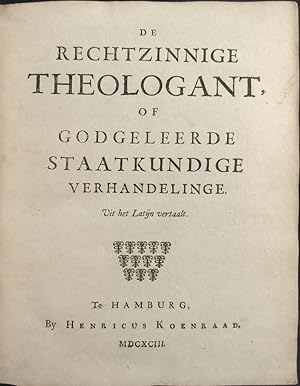About this Item
First edition in Dutch of TRACTATUS THEOLOGICO-POLITICUS, the THEOLOGICAL-POLITICAL TREATISE. 8vo [16 x 20cm], handsomely bound in full vellum with leather bands, spine lettered in manuscript. (xxviii), 360 pp. A very fine and handsome copy of this very scarce first edition printing, the text-block very fresh and clean, a strong impression of the text, the binding as pristine. FIRST ISSUE, FIRST PRINTING OF THE VERY RARE DUTCH EDITION WHICH SPINOZA DID NOT WANT PUBLISHED OUT OF FEAR OF RETRIBUTION. QUITE ELUSIVE, AND ONE OF THE MOST IMPORTANT PHILOSOPHICAL WORKS OF THE EARLY MODERN PERIOD. Baruch Spinoza is unquestionably one of the most important philosophers of all time -- and certainly, perhaps the most radical of the early modern period. His thought combines a commitment to Cartesian metaphysical and epistemological principles with elements from ancient Stoicism and medieval Jewish rationalism into a nonetheless highly original system. His extremely naturalistic views on God, the world, the human being and knowledge serve to ground a moral philosophy centered on the control of the passions leading to virtue and happiness. They also lay the foundations for a strongly democratic political thought and a deep critique of the pretensions of Scripture and sectarian religion. Of all the philosophers of the seventeenth-century, perhaps none have more relevance today than Spinoza. Spinoza's aim in TRACTATUS THEOLOGICO-POLITICUS, which he completed and published anonymously in 1670, was to prove that the stability and security of society is not undermined, but rather enhanced by freedom of thought, meaning primarily, the freedom to philosophize. As is clear from the text, he concluded that the primary threat to this freedom emanated from the clergy, whom he accused of playing upon the fears and superstitions of people in order to maintain power. His solution was to divest the clergy of all political power, even to placing authority over the practice of religion into the hands of the sovereign. The sovereign, Spinoza argued, should extend broad liberties within this domain, requiring adherence to no more than a minimal creed that was neutral with respect to competing sects and the meaning of which was open to a variety of interpretations. This he hoped, would allow philosophers the freedom to do their work unencumbered by the constraints of sectarianism. As was to be expected, the work was met with a firestorm of criticism. It was condemned as a work of evil, and its author was accused of having nefarious intentions in writing it. Even some of Spinoza's closest friends were deeply unsettled by it. Though he had assiduously tried to avoid it, Spinoza found himself embroiled in heated religious controversy and saddled with a reputation for atheism, something he greatly resented. Shortly after the publication, Spinoza moved to the Hague, where he was to live out his remaining years. Besides having to deal with fallout from this treatise, he witnessed a political revolution that culminated in the murder by an angry Orangist-Calvinists mob of the Grand Pensionary of Holland, Jan De Witt as well as his brother Cornelius. Spinoza admired De Witt for his liberal policies and was horrified by the murder. With the ascent of the Orangist-Calvinist faction, he felt his own situation to be tenuous. In the words of PRINTING AND THE MIND OF MAN, ".[The TRACTATUS THEOLOGICO-POLITICUS] constituted an extension to political thought of his ethical views. Man is moved to the knowledge and love of God; the love of God involves the love of our fellow men. Man, in order to obtain security, surrenders part of his right of independent action to the State. But the State exists to give liberty, not to enslave; justice, wisdom and toleration are essential to the sovereign power. Baruch Spinoza (1632-1677), scion of a leading Jewish family in Europe's most cosmopolitan city of the seventeenth century, Amsterdam, provided the intellectual architecture for a philo. Seller Inventory # 29710
Contact seller
Report this item
![]()

